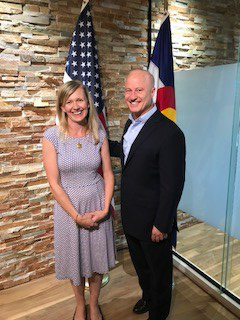Oncology Nurses Must Share Experiences, Perspectives to Advocate for Change
By Courtney Welch, BSN, RN, OCN®

As an oncology nurse, I’m grateful to work alongside so many colleagues who bring dedication, grace, and skill to their work. No other industry in the world shares the same frustrations or emotional tolls as nursing, but we continue to bring enthusiasm, optimism, and devotion to our daily work. Nurses strive to ensure the best for their patients. It’s the call to patient advocacy that is at nursing’s core.
Recently, I had the opportunity to advocate for my patients somewhere beyond my hospital’s walls—in my congressman’s office. I met with my U.S. House representative, Michael Coffman (R-CO), to discuss the importance of the Cancer Planning and Communications Act (H.R. 5160) (https://www.canceradvocacy.org/cancer-policy/ccpc-act/). The bill is an effort to develop individualized cancer care plans for Medicare beneficiaries.
Although we have different party backgrounds, the importance of cancer care was an easy mediator for us. Coffman was agreeable, impartial, and empathetic to our effort. Even though he didn’t say yes when I asked him to cosponsor H.R. 5160, he didn’t say he was opposed to it either. Ultimately, I walked away from his office feeling proud about our work and our profession’s enthusiasm, optimism, and devotion to the well-being of our patients.
A Nurse’s Job Is Never Finished
Very few legislators truly understand the work that oncology nurses do every day. Nursing represents the largest group of healthcare professionals—and the most trusted (http://news.gallup.com/poll/224639/nurses-keep-healthy-lead-honest-ethical-profession.aspx?g_source=CATEGORY_SOCIAL_POLICY_ISSUES&g_medium=topic&g_campaign=tiles)—but we’re rarely the first ones at the table when it comes to making decisions in the healthcare system. Our profession can no longer afford to sit on the sidelines.
Consider this a call to action. If you haven’t already, join a board (https://www.ons.org/member-center/election/materials), serve in a leadership position (https://www.ons.org/about/leadership/leadership-development-committee), write to your Congressional representatives, become active in your professional organization, and, most of all, share your voice (https://voice.ons.org/advocacy/get-involved) and advocate for your patients (https://www.ons.org/advocacy-policy).
As oncology nurses, we can speak first hand to the limitations in health care. We already talk about these limitations to each other, and it’s time that we direct our voices outward. Nursing brings a valuable perspective to legislators, and it’s vital that we share our experiences to influence change on a larger scale. Bringing advocacy beyond the bedside is something that we owe to our patients and our colleagues. Now let’s get busy.
